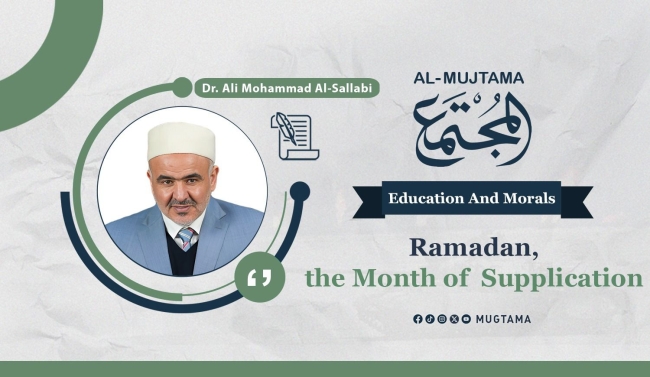Ramadan, the Month of Supplication
Indeed, supplication and entreating to Allah the Almighty are among the most beloved deeds to Allah, and it is the best way to spend time and breathe. It is the best means by which a servant draws closer to his Lord, glorified and exalted be He, and it is the key to all goodness that a servant attains in this world and the Hereafter.
Supplication is one of the greatest acts of worship, and it is a right of Allah, glorified and exalted be He, that should not be directed to anyone else. It holds a great status in religion and occupies a lofty position therein due to the humility, acknowledgment of weakness, and neediness to Allah that it entails. Worship is most perfect when the heart is present, and supplication is the closest act of worship to achieve this purpose. Supplication is inseparable from reliance and seeking help from Allah. Reliance is when the heart depends on Allah and trusts Him to attain what is desired and repel what is disliked. There are numerous texts highlighting the virtue and significance of supplication, among which is the saying of Allah, the Most High, in Surah Al-Baqarah: ''When My servants ask you (O Prophet) about Me: I am truly near. I respond to one’s prayer when they call upon Me. So let them respond (with obedience) to Me and believe in Me, perhaps they will be guided (to the Right Way).'' (Quran 2:186)
Ramadan has a special significance in supplication, for the fasting person's supplication is not rejected if they are sincere in their fasting, sincere in their worship, and truthful with Allah. In a Hadith, the Prophet Muhammad (peace be upon him) said: “There are three prayers that are not rejected: the prayer of a father for his child, the prayer of the fasting person and the prayer of the traveller.” (Reported by Al-Bayhaqi in his Sunan Al-Kubra).
And Ramadan is the month of supplication and the month of response, the month of repentance and acceptance. It is fitting for a Muslim, when supplicating, to be in a state of humility, necessity, and detachment from placing hope in anyone but Allah. His supplication should not be merely experimental and uncertain, for indeed the Messenger of Allah (peace be upon him) said: “Call upon Allah while being certain of being answered, and know that Allah does not respond a supplication from a heart that is heedless and occupied by play.” (Reported by At-Tirmidhi).
Supplication is evidence of reliance on Allah. The essence of reliance is placing the heart's trust in Allah, while also taking the permissible means. This meaning is most evident in the act of supplication, as the supplicant seeks assistance from Allah alone, entrusting his affairs solely to Him. Supplication is a means to elevate one's aspirations, as the supplicant turns to a powerful source to fulfil his needs and seeks assistance in all matters.
The righteous predecessors used to allocate specific supplications for Ramadan, persisting in them throughout the month, during prostrations, after prayers, before breaking the fast, at the time of breaking the fast, and in the pre-dawn hours. They paid great attention to Ramadan, striving to make the most of it in obedience to Allah. They raced towards goodness, especially during seasons of blessings, seeking to multiply their good deeds. It is confirmed that they would supplicate to Allah for six months to reach Ramadan, then supplicate for six months for their deeds to be accepted.
Narrated by Umar ibn al-Khattab (may Allah be pleased with him) that he said: "I do not carry the concern of receiving the response, but rather the concern of supplication. When the inspiration to supplicate comes, then surely the response comes with it." And Hasan al-Basri said concerning the verse of Allah (which means): "Call upon Me; I will respond to you" [Quran 40:60], he said: "Act and rejoice, for it is the right of Allah Almighty to respond to those who believe and do righteous deeds and to increase them from His bounty." (Narrated by At-Tabari).
Seeking the times of supplication where acceptance is hoped for makes it closer to being answered, such as the time of Adhan, between Adhan and Iqamah, and in the last third of the night. Therefore, it is incumbent upon the believer to be diligent in this worship and to seize the opportunities of this noble month by turning to Allah in supplication, asking earnestly, eagerly seeking His favour, while observing the conditions and etiquettes of supplication. Hoping to be among those who are winners of Allah's rewards, for indeed, Allah frees people from the Hellfire every night of Ramadan.


